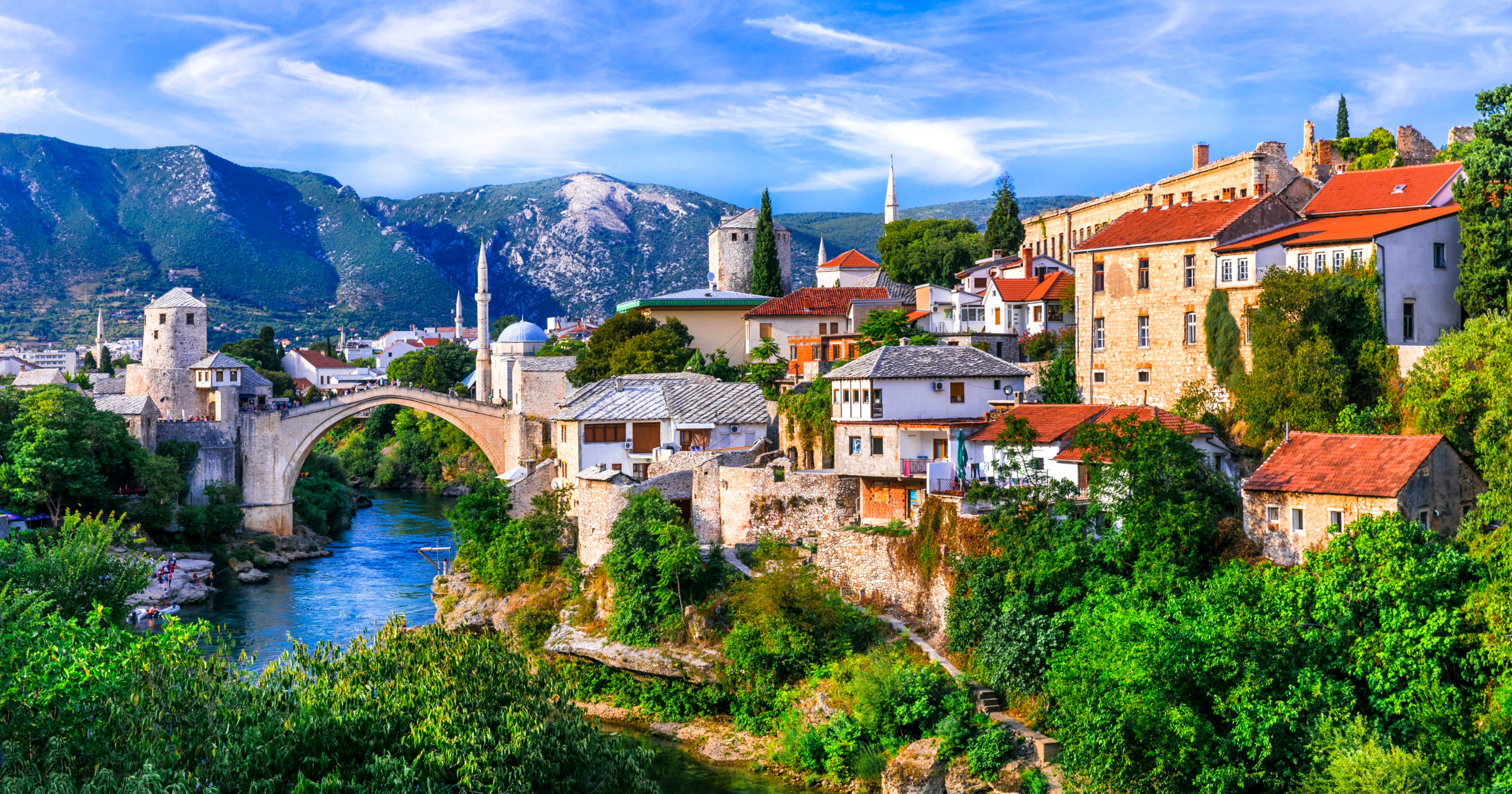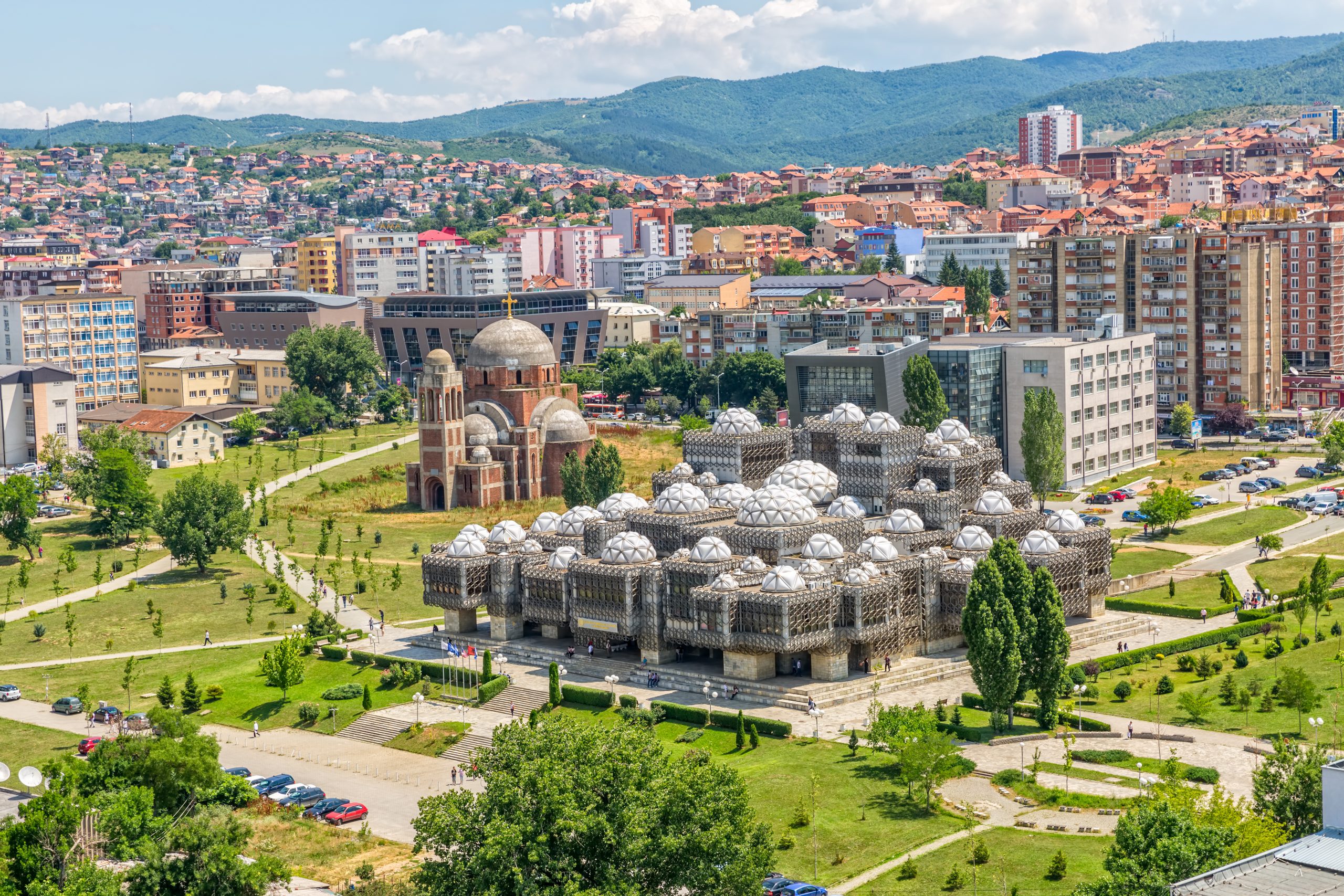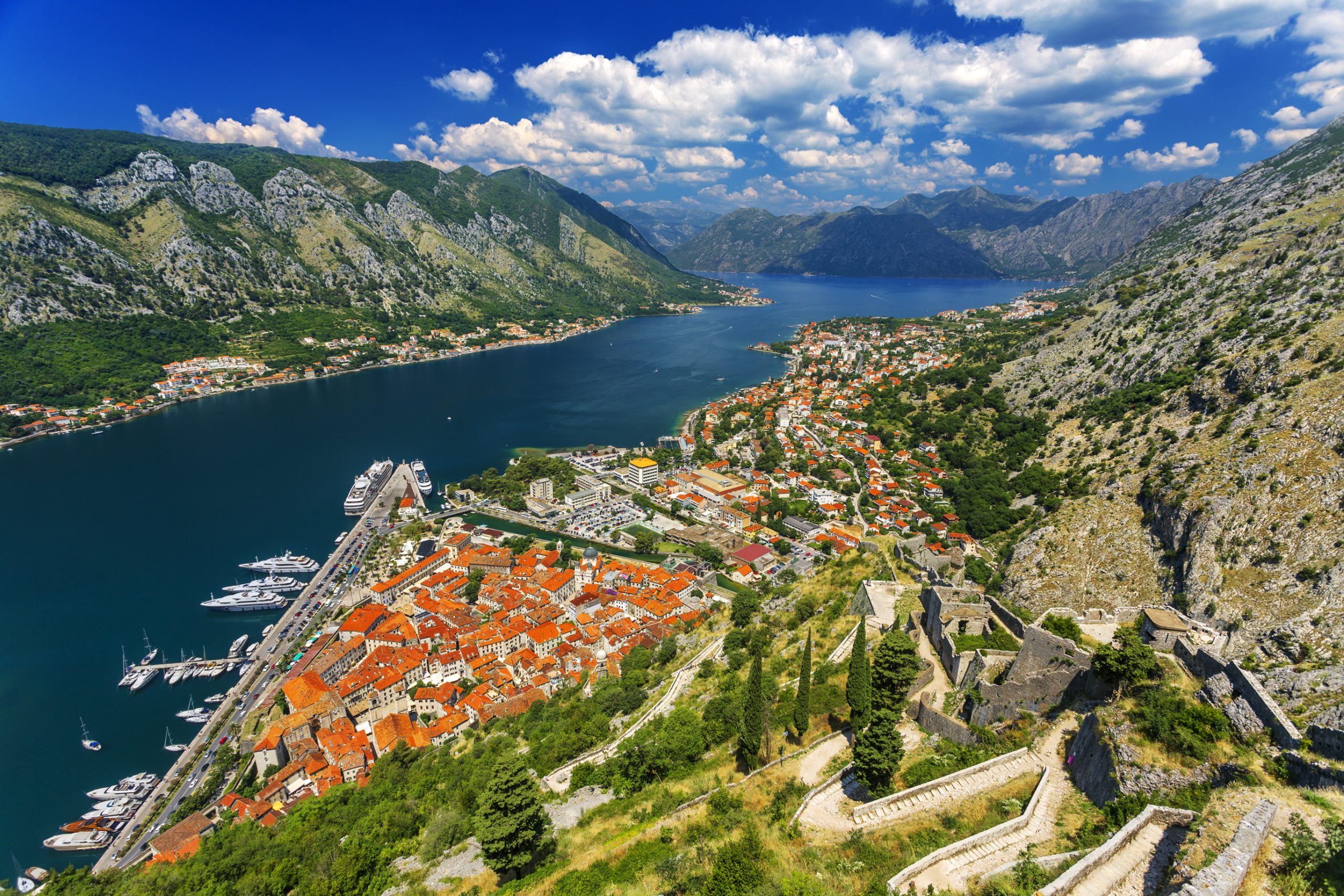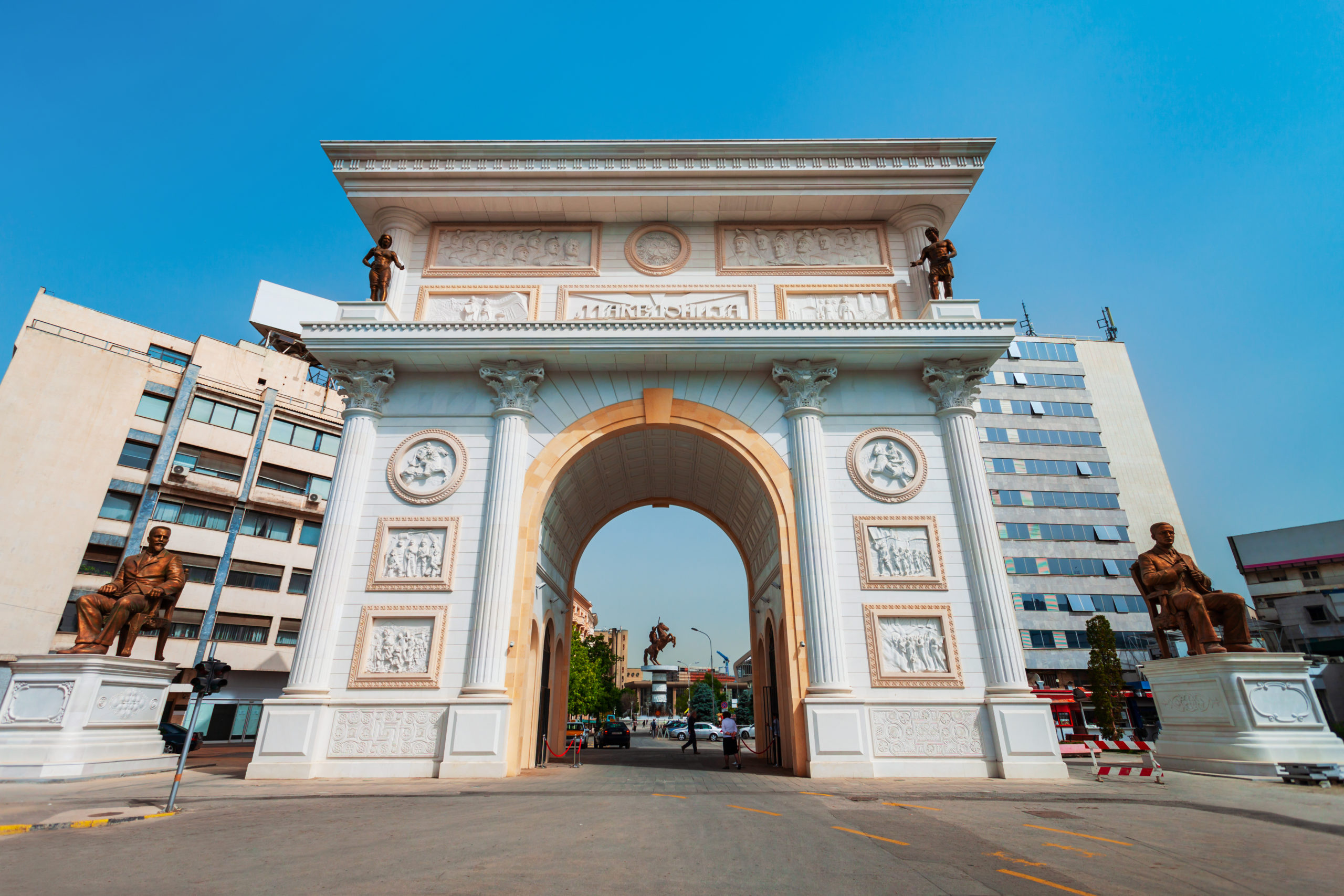Strategic Analysis Balkan Brief
Bi-weekly review (01.11 – 15.11.2022)
Petra Bošková, Ivan Iliev,Barbora Tomanová, Adam Šiko, Laura Ďorďová, Marianna Dobisová, Sára Gregová, Tibor Čech, Lenka Semančíková, Victoria Valová

Old Town Mostar, Bosnia and Herzegovina; Photo: leoks/Shutterstock
Albania
Massive migrant crisis: More than 12,000 Albanian migrants have arrived in the UK so far
The latest data published on November 9 show the increase in Albanian migrants coming to the UK is massive. While in 2021, about 100 Alban migrants went to the UK, during the current year, there have already arrived 12,000 migrants from Albania. What is more, out of all migrants crossing UK borders on boats, 80% are from Albania.
“The rise has been exponential, and we think that is in the main because Albanian criminal gangs have gained a foothold in the north of France,” Dan O’Mahoney, Clandestine Channel Threat Commander, told the Home Affairs Select Committee last week.
Around 10,000 of this year’s Albanian migrants were single adult men. According to Eurostat population figures, this represents approximately 1% of Albania’s working-age men.
Albanian migrants have submitted 7,267 asylum applications until June 2022, more than doubling the number submitted the previous year. In general, 53% of Albanian claims are accepted. In the six months leading up to June 2022, 440 people were returned to Albania, almost all of whom were single adult men.
Albanians want to leave their home country for various reasons, such as corruption, low salaries, poor working conditions or youth unemployment, which is currently 20%.
Albanian Prime Minister Edi Rama has accused the United Kingdom of using his citizens as scapegoats to justify its “failed policies” on borders and migration. According to Rama, Home Secretary Suella Braverman’s comments about the UK being invaded would fuel xenophobia.
Rama added, “It’s not about Albanians or aliens or gangsters, but about failed policies on borders and crime. This kind of language is not a policy, a programme, or a vision. [It] is nothing but fuelling xenophobia and targeting and singling out a community. I admire everything that Britain represents. But I am disgusted about this kind of politics that, in the end, is doomed to fail.”
Sources:
- BBC News, “Don’t blame us for UK border problems, says Albanian PM”, https://www.bbc.co.uk/news/uk-politics-63489276
- BBC News, “Albanian migrants: Why are they coming to the UK and how many have arrived? “, https://www.bbc.co.uk/news/explainers-63473022
Albania
Personal data up for grabs
The latest report from November 14 shows that in the Western Balkans, cyberattacks and data leaks are occurring more frequently than ever. Regarding safeguarding its citizens’ personal data, Albania is the worst in the region. In December 2021, a list of personal information of hundreds of thousands of Albanian citizens appeared online, containing their employment and pay information as well as ID numbers. However, this was not the first leak to have happened in Albania.
In April of the same year, the Tirana-based portal Lapsi.al disclosed a voter database with more than 900,000 names misused by the Socialist Party. Personal information such as contact details, numbers of the polling stations, employment information, and a description of each voter’s political affiliation were all part of the disclosed database. It even identified the party official keeping tabs on voters’ political inclinations. Five senior Socialist Party members received intelligence from the National Information Society Agency (NISA) not only about citizens of Tirana but about the entire Albanian population and subsequently circulated the data around the organization in a pyramid style until it reached the people in charge of tracking individual voters.
After the elections, which the Socialists won, four individuals from NISA and the Tax Administration were detained. However, before the prosecution could make its findings public, there was another leak concerning license plates.
If the investigation’s findings had been made public before election day, it would have significantly affected the outcome. According to experts, in addition to enhancing security, Albania needs to rectify its law governing personal data protection, as private entities bear the costs of public institutions’ insufficient online safeguards. To increase security, the Office of the Commissioner for Data Protection announced that after conducting an administrative inquiry, it advised relevant authorities to restrict access to and use of data stored in state databases. While Genti Progni, an IT expert, demands harsher punishments for those granted access and misuse it, Albanian legal expert Ervin Karamuco underlines the urgency to replace all Albanian National ID numbers and identity cards and take urgent action against the security breaches.
Sources:
- Zhitia Albione and Gjerani Elisa, Balkan Insight, “In Kosovo and Albania, Personal Data Up for Grabs”, https://balkaninsight.com/2022/11/14/in-kosovo-and-albania-personal-data-up-for-grabs/
Bosnia and Herzegovina
The lack of transparency in the financing of political parties remains a problem in BiH
Transparency International’s Corruption Perception Index (CPI), published at the beginning of November, which looked closely at the level of corruption worldwide, placed Bosnia and Hercegovina in 111th position (of 180 countries) amongst countries in the Balkan peninsula and other countries, such as Mongolia, Vietnam and Thailand. The state of corruption in these countries was described as deteriorating.
It is proven by the fact that this year ́s election in BiH was not without vicissitudes regarding corruption and transparency of the elections.
Moreover, according to the report published by the Group of Countries Against Corruption (GRECO), only one recommendation was fulfilled regarding the publication of information on the finances of political entities participating in the electoral process in BiH.
GRECO stated, “political parties were obliged to keep records of membership fees and voluntary contributions and to issue certificates thereof, to include benefits received from related parties in the financial accounts, and to establish internal financial control mechanisms”.
However, Nedim Hogić, a Bosnian lawyer and a Ph.D. candidate at Sant’ Anna School of Advanced Studies stated that the critical problem is that the legislative framework in BiH does not fully prescribe the obligation of political parties to be transparent and has not been reformed since 2012.
He explains further that according to the current law, parties are not obliged to provide data on legal entities they control.
European Commission’s reports on Western Balkan countries, published in the middle of October this year, highlighted the need for changes and improvements regarding media funding. In post-soviet democracies, societies are often polarized by the media. The lack of transparency in financing political parties is not the only sector where this issue emerges.
Sources:
- Popović Sofija, European Western Balkans, „The lack of transparency in the financing of political parties remains a problem in BiH“, https://europeanwesternbalkans.com/2022/10/31/the-lack-of-transparency-in-the- financing-of-political-parties-remains-a-problem-in-bih/
- Transparency International, „BiH is Among the Countries where the State of Corruption is Deteriorating the Most, Life-Threatening Citizens“ https://ti- bih.org/bih-is-one-of-the-countries-in-which-corruption-is-rapidly-worsening-its-citizens- exposed-to-life-threatening-conditions/?lang=en
- Mirilović Filip, European Western Balkans, „European Commission on media funding in the Western Balkans: Political influence and lack of transparency remain an issue“, https://europeanwesternbalkans.com/2022/10/29/european-commission-on-media- funding-in-the-western-balkans-political-influence-and-lack-of-transparency-remain-an- issue/
Croatia
Croatia’s accession to the Schengen zone
On November 10, with a 534-53 majority, European Parliament voted in favor of Croatia’s admission to the Schengen zone. The Schengen zone is the world’s largest passport-free zone, abolishing border control between 26 European countries.
The Council of the EU started the decision-making process on Croatia’s admission to Schengen in June this year, but the Council also requested the opinion of the European Parliament. Although the decision of the European Parliament is not binding and final, it is a required procedural step. The EU Council will now have to take a final decision, acting unanimously. This decision should be unproblematic since, on December 9, 2021, the Council already confirmed that Croatia met all of the criteria for joining the Schengen Area. Now, European Parliament urges the Council to continue with the process and adopt a final decision.
Croatia has met 281 recommendations in 8 areas of the Schengen legislation, which means that it underwent the most comprehensive evaluation to join the Schengen area out of any European country so far.
However, some neighboring countries are unsatisfied with Croatia joining the Schengen Area. Bosnia and Herzegovina shares almost a thousand kilometers of the border with Croatia, and it fears that Schengen rules may reinforce the border between the two countries. Merchants especially expect problems in the speed of flow of goods across the border.
Another problematic aspect is the inhumane treatment of illegal migrants on the country’s borders by Croatian police officers. As a result, European Parliament demanded Croatia inform the Parliament and Council of how it implemented the independent mechanism to monitor the actions of police officers in cases of illegal migration.
Sources:
- Al Jazeera, “European Parliament approves Croatia’s admission to Schengen zone“,https://www.aljazeera.com/news/2022/11/10/european-parliament-approves-croatias-admission-to-schengen-zone
- Meijer Bart, Reuters, “Croatia gets green light for Schengen admission from European Parliament“, https://www.reuters.com/world/europe/croatia-gets-green-light-schengen-admission-european-parliament-2022-11-10/
- European Parliament, “MEPs back Croatia’s Schengen accession“, https://www.europarl.europa.eu/news/en/press-room/20221107IPR49610/meps-back-croatia-s-schengen-accession
- Croatia Week, “Croatia set to join Schengen Area“, https://www.croatiaweek.com/croatia-set-to-join-schengen-area/

Prishtina, Kosovo. Photo: OPIS/ Shutterstock.com
Kosovo
Kosovo-Serbia relations remain heated
In November 2022, the apparent conciliatory relations between Kosovo and Serbia again diverted from peacemaking as the unresolved sovereignty dispute from 2008 between the two countries escalated.
The decision of the Kosovo government to replace car license plates issued to Serbs by Serbian authorities with new license plates from the Republic of Kosovo is meeting strong opposition from the side of Kosovo Serbs. As a result, the long-discussed and postponed license-plates measures entered to force on November 1, 2022.
Kosovo Serbs have responded by protesting through the withdrawal from state institutions, such as courts, police, parliament, government or municipal administrations, blocking roads in the Serb-dominated north of Kosovo, or participating in demonstrations. These events happened despite the fact that Kosovo has agreed to delay further legislation of confiscating outdated car registration numbers to reduce tensions on the stimulus of the European Union.
The EU has been trying to mediate the conflict since 2013 to maintain peace through diplomacy and cooperation. “The Kosovo Serbs’ withdrawal from Kosovo institutions is not a solution to the current disputes and has the potential to escalate further the tensions on the ground”, expressed in a statement on November 5 by the EU foreign policy chief Josep Borrell. Normalization of Kosovo-Serbia relations is imperative to advance their membership in the EU.
“Diplomatic interventions, along with a top-level dialogue meeting on August 18, led to a temporary relief in the form of extended deadlines and promised to continue discussions. Yet, the parties’ willingness to risk dangerous confrontations on the ground, at best, set the process back.” Caroline Ziadeh, the Special Representative of the Secretary-General for Kosovo and head of the United Nations Interim Administration Mission in Kosovo (UNMIK), commented on the situation. Furthermore, Ziadeh mentioned that the deployment of Serbian troops could potentially escalate the situation to have “serious consequences”.
Sources:
- Carbonaro Giulia, News Week, “Serbia Sends Troops to Kosovo Border as NATO Could Face Another Conflict’. Newsweek (blog)”, https://www.newsweek.com/serbia-sends-troops-kosovo-border-nato-could-face-another-conflict-1756047.
- Falk Thomas O, Al Jazeera, “What’s behind the Renewed Tensions between Serbia and Kosovo?’ (blog)”, https://www.aljazeera.com/news/2022/8/4/whats-behind-the-renewed-tensions-between-serbia-and-kosovo
- Isufi Perparim, Balkan Insight, “Kosovo PM Postpones Controversial Licence Plate Change for Serbs”, https://balkaninsight.com/2022/10/28/kosovo-pm-postpones-controversial-licence-plate-change-for-serbs/
- Ozturk Talha. Anadolu Agency, “NATO Urges Serbia, Kosovo to Refrain from Actions That Would Increase Tensions”, https://www.aa.com.tr/en/europe/nato-urges-serbia-kosovo-to-refrain-from-actions-that-would-increase-tensions/2732184.
Kosovo
Visa-free entry between BiH and Kosovo
On November 3, six Western Balkan countries signed new agreements which enabled their citizens to cross borders using only identity cards. In addition, the deal eliminated the last visa restrictions in the region – between Kosovo and Bosnia and Herzegovina as a part of the Berlin Process. Berlin Process is a German-led initiative to revitalize regional cooperation among WB6 states.
When Kosovo started to issue its passports, BiH decided not to recognize the passports of Kosovo. Therefore Kosovo decided to impose visa restrictions on BiH in 2014. Kosovo aimed to decrease BiH companies exporting to Kosovo and pressure institutions to establish visa-free travel. As a result, export from BiH to Kosovo decreased, and visa restrictions remained in practice. Kosovo citizens have needed a visa to enter BiH since the declaration of its independence in 2008.
One of the obstacles to establishing visa-free entry between the two countries was the tripartite presidency of Bosnia and Herzegovina. Two out of three members, Šefik Džaferović and Željko Komšić, supported visa-free travel. Still, the Serb member Milorad Dodik was strictly against it despite the fact Dodik also represents himself as a strong advocate of a common regional market for the WB, which goes hand in hand with visa liberalization.
In practice, getting a visa was a complicated process. People from BiH were asked to apply for and pick up their visas in countries such as Croatia, Albania and Slovenia. On the other hand, Kosovars often failed to get Bosnian-Herzegovinan visas without thorough explanations.
Sources:
- Beharić Samir and Bokshi Egzona, European Western Balkans, “In Mobility We Trust: Let’s abolish Bosnia-Kosovo visa regime and boost Erasmus in the Western Balkans“, https://europeanwesternbalkans.com/2020/11/06/in-mobility-we-trust-lets-abolish-bosnia-kosovo-visa-regime-and-boost-erasmus-in-the-western-balkans/
- Kurtić Azem, Balkan Insight, “Bosnia, Kosovo take down last visa wall in Balkans“, https://balkaninsight.com/2022/11/03/bosnia-kosovo-take-down-last-visa-wall-in-balkans/
- Cvetković Sandra and Maja Ficovic, Radio Free Europe, “As EU Refloats Visa-Free Entry, Ethnic Serbs Say They Could Embrace Kosovo Passports“, https://www.rferl.org/a/eu-visa-free-entry-serbia-kosovo-passports/32074265.html

Bay of Kotor, Montenegro. Photo: Serglena/Shutterstock
North Macedonia
North Macedonia and Albania are strengthening their cooperation to deal with the crisis
On November 14, the Prime Ministers of Albania and North Macedonia issued a statement that the relations between North Macedonia and Albania have never been better, Dimitar Kovačevski and Edi Rama stated at a joint session in Skopje. Following the decision of the European Union to launch accession negotiations with North Macedonia and Albania sooner this year, countries want not only to walk on the European path together but also to mutually cooperate and deal with the challenges of the energy crisis, prime ministers confirmed. They want to do so, especially during the global economic and energy crisis, with severe challenges in providing electricity and food in the region of Western Balkans.
It was the second time that representatives of the two countries met for discussions in such a format and signed agreements and memoranda on several topics, including EU integration, defense, security, infrastructure, energy, culture, the fight against international crime, and railway connection. Furthermore, the two prime ministers who discussed the future and what could be done for their countries’ development and good neighborliness sent a clear message that North Macedonia must not stop seeking the European path but continue in its effort.
“The road to the EU will not be easy, neither for North Macedonia nor for Albania, but in the end, the great reward will be to be proud citizens and residents of the EU with our heads held high, to be richer, to have a better life and prosperity,” said prime minister Dimitar Kovačevski.
One of the agreements that were signed refers to cooperation for the return of illegally exported icons recently found in Albania. In addition, the document enables the recovery of twenty-one icons to monasteries in North Macedonia. Dimitar Kovačevski and Edi Rama said this is only a confirmation of the new spirit of cooperation between the region’s countries and the continuation of the promotion of the Open Balkan partnership.
Sources:
- Deutsche Welle, „Ковачевски и Рама: Мора да го изодиме европскиот пат“, https://www.dw.com/mk/kovacevski-i-rama-so-poraka-od-skopje-ne-smeeme-da-izbereme-izolacija-mora-da-go-izodime-evropskiot-pat/a-63749375?maca=maz-rss-maz-pol_makedonija_timemk-4727-xml-mrss
- VOA News, „Ковачевски и Рама потпишаа договори за унапредување на Отворен Балкан“, https://mk.voanews.com/a/6833500.html
- Opserver, „Отворен Балкан е компатибилен со Берлинскиот процес и треба да продолжи, порачаа Ковачевски и Рама“, https://opserver.mk/politika/vlast/otvoren-balkan-e-kompatibilen-so-berlinskiot-proces-i-treba-da-prodolzhi-porachaa-kovachevski-i-rama/

Pella Square in the center of Skopje city, North Macedonia. Photo: saiko3p/Shutterstock
Montenegro
Political instability in Montenegro
On November 8, President Milo Djukanović, backed by his Democratic Party of Socialists (DPS), organized a protest in Podgorica against the law regarding the power and competence of the President. The new law was used as a countermove by the political leader Miodrag Lekić, who was not named as a new prime minister by the President in the September of this year. As a result, Djukanović claimed that he would not sign the document, nor would he name Lekić the new prime minister. Instead, he demands that there will be new elections.
Under the new legislation, the President is obliged to propose a prime minister-designate if the candidate has the support of 41 members of parliament. If there is not such a majority, the President has to organize a second round of consultations with political parties and propose another candidate.
However, NGO and CGO organizations are criticizing it, as, in their opinion, the law is undermining the power of the President and, on the other hand, is lowering the position of the citizens. At the same time, organizations claim it strengthens the role and interest of political parties.
After the fall of the former prime minister Dritan Abazović in August of 2022, the country is still in an unstable political situation and is facing many crises. The crisis is also connected to the constitutional court, as a mandate has expired for some of the judges. EU is concerned with this situation, as current instability can shift a country from so far relatively prosperous path towards the EU.
Sources:
- Koseva Denitsa, BNE Intellinews, „President and parliament locked in a power struggle to control Montenegro“, https://www.intellinews.com/president-and-parliament-locked-in-power-struggle-to- control-montenegro-261903
- Kajosević Samir, Balkan Insight, „Montenegrin Parliament criticized for Law Restricting President’s Powers”, https://balkaninsight.com/2022/11/02/montenegrin-parliament-criticized-for-law-restricting-presidents-powers/
Serbia
The Berlin Process as a hope for the normalization of relations?
On November 3, the six Western Balkans countries signed three agreements during the Berlin Process. This format, created by former German chancellor Angela Merkel and launched in 2014, seeks to enhance regional integration by fostering rapprochement between the six states and the EU. The accords signed by leaders of the six countries will allow individuals’ free movement throughout the region and the reciprocal recognition of the professional qualifications of architects, doctors, and university degrees after two years of protracted discussions. The agreements are significant not just for regional integration but also in light of the ongoing hostilities between Serbia and Kosovo.
Over the past week, there have been a few tensions at the border between these countries as Prishtina begins to implement a new cars’ license plate regulation, which requires all car owners in the country to use plates issued by the Kosovo government. However, German Chancellor Scholz expressed his optimism that the new agreement on reciprocal recognition will open the door also to future rapprochement between Kosovo and Serbia. According to him, the need to put regional disputes behind them is now to speed up the process of normalizing relations between countries.
Meanwhile, the Franco-German plan to resolve the Serbia and Kosovo dispute leaked – again. Officials from the EU are now concerned that the latest escalations could halt any settlement between the two sides. Based on this concern, the plan focuses on normalizing ties from a shared EU future perspective, with the exchange of permanent missions – similar to embassies but at a lower level – being the most crucial part. Serbian representatives did not accept this proposal for a deal on Kosovo’s final status and its future relations with Serbia. Serbian President Aleksandar Vučic deemed this stance unacceptable because it goes against Serbia’s constitution, which expressly rejects the recognition of Kosovo. Ivica Dačic, Serbia’s Minister of Foreign Affairs, said the Franco-German plan implies the position that the independence of Kosovo is already a done deal that Serbia cannot accept.
Sources:
- Armstrong Mark, Euronews, „Germany calls on the Western Balkans to resolve conflicts to ensure regional stability“, https://www.euronews.com/2022/11/03/germany-calls-on-the-western-balkans-to-resolve-conflicts-to-ensure-regional-stability
- Brzozowski Alexandra and Noyan Oliver, EURACTIV, „Western Balkans sign landmark agreements in Berlin ahead of December summit“, https://www.euractiv.com/section/enlargement/news/western-balkans-sign-landmark-agreements-in-berlin-ahead-of-december-summit/
- Brzozowski Alexandra, Gotev Georgi and Taylor Alice, EURACTIV, „Leak: Franco-German plan to resolve the Kosovo-Serbia dispute“, https://www.euractiv.com/section/enlargement/news/leak-franco-german-plan-to-resolve-the-kosovo-serbia-dispute/
- European Western Balkans, „Berlin Process: Western Balkans leaders sign agreements on increased mobility“, https://europeanwesternbalkans.com/2022/11/03/berlin-process-western-balkans-leaders-sign-agreements-on-increased-mobility/

Contact us